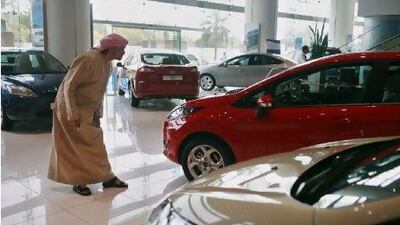Car dealers reported strong sales growth across the Emirates in the first half of the year, despite changes to Central Bank rules making it more difficult for buyers to secure car finance.
For the first half of the year, Ford, General Motors, BMW, Al-Futtaim Motors, which distributes Toyota, and Nissan and Renault all experienced double-digit growth in sales compared with the same period last year.
"Our retail sales are well up this year versus last year, by about 20 per cent," said Felix Welch, the director of sales and marketing at Arabian Automobiles, the exclusive dealer for Nissan in Dubai and the Northern Emirates.
Ford posted gains of 63 per cent in the Middle East for the first half of the year, with UAE sales up 30 per cent on the same period last year. The Ford Taurus, Fusion and Mustang recorded significant growth across all GCC markets, with the Taurus the most popular model, increasing 163 per cent during the first half of the year.
Larry Prein, the managing director for Ford in the region, said sales had been unaffected by the Central Bank's decision in May to require a 20 per cent deposit on all car loans.
"We are not concerned, it's a non-story right now," he said.
Many other manufacturers and dealers disagreed that the rules have had little or no effect, conceding that sales in May and last month slowed notably compared with the first four months of the year.
The Abu Dhabi and Dubai Chambers of Commerce have been lobbying the Central Bank to change the rules, which were introduced to strengthen the banking industry and shield it from bad loans.
"I cannot see it not having an impact on people," Mr Welch said. "It's definitely dampening consumers' ability to buy."
He said there had also been fewer consumers in the showrooms last month as people were waiting to see what deals were available during Ramadan.
Honda, which has also been affected by March's earthquake and tsunami in Japan, said the Central Bank rules had exacerbated an already difficult quarter.
"Supply is coming back, but we expect flat sales for 2011," said Mark Kass, the managing director of Al-Futtaim Motors' Honda unit.
Hugh Dickerson, the sales and marketing director at its Toyota unit, the market leader in the UAE, said demand for cars had outstripped supply during the first half of the year due to the effect of the Japanese disasters.
"We have continued the strong growth seen in the first quarter. We are well above where we were last year, in double digits," he said. "I'm absolutely certain that without the earthquake and tsunami we would have continued to see growth at the same rate as the first quarter."
General Motors (GM) reported total sales of 67,624 vehicles in the first half, up 22 per cent compared with the same period last year.
US brands such as Ford and GM have been gaining ground in the past year on the traditionally popular brands from the Far East.
GM's retail sales - purchases made by individual customers - rose by 54 per cent and represented 71 per cent of total sales.
Renault is also a brand growing rapidly in the Middle East, selling 4,300 cars in the first half, up 256 per cent on the same period last year. BMW sold 9,134 cars in the first six months of the year across the Emirates, a 13 per cent increase.

